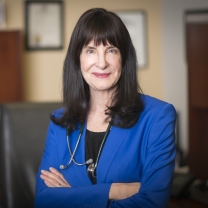 / The Changed Paradigms of Grammahood
Subscribe
/ The Changed Paradigms of Grammahood
Subscribe

Over five years ago, I joined the ranks of 35 million other American women by becoming a grandmother. On my way to Grammahood, I had a very significant job (I am a pediatrician), a very important position (I am a distinguished professor of pediatrics), two sons, and a long marriage. Once I started this last great role of my life, it was clear to me that being a Gramma was simply the best. Holding my new grandbabies, swaddling them into a tight football, spooning squash into their mouths, splashing in the tub, and stacking blocks were not only unequaled experiences, they were life-reaffirming.
However, since entering Grammahood, I have been preoccupied with trying to understand how best to approach my new role and, more broadly, what the role of grandmother is in our modern world of dispersed families, delayed marriage, high divorce rates, egg and sperm donation, surrogacy, same sex marriage, increased longevity, and social media. As a result of these dramatic shifts in how we live our lives, I believe the fundamental paradigms of Grammahood have shifted for my generation of grandmothers.
Paradigm 1: The past supremacy of the wisdom of the grandmother no longer exists. It has been replaced by the all-knowing internet and social networks of like-minded people.
The long string of grandmothers who came before us were the midwives, the breastfeeding advocates, the dullas, and the child care experts. They held all the wisdom, passed down from one grandmother to the next. For tens of thousands of years, her daughters, sons, granddaughters, and grandsons did what she told them to do; she was revered and equally feared, and the matriarch, if not the queen, of the family.
I think of my own grandmother, Sadie, born in the 1890s, as an example. An immigrant from Russia and a mother at age 17, she told me she learned everything she needed to know about being a mother from her mother-in-law, Anna. Anna helped Sadie give birth (at home), showed her how to nurse, and taught her how to discipline her five children with a stern hand. Sadie did whatever Anna told her, and in turn, Sadie helped my mother, Rachel (also an immigrant and born during World War I), do the same with me and my two siblings. Although Dr. Spock had just published his first book on childrearing right before my brothers and I were born in the post-World War II period, my mother relied more on the wisdom transferred from Anna, to Sadie, to her, than she did on the new concepts espoused by Dr. Spock.
But my great-grandmother, grandmother, and mother are ancient history. Anna and Sadie never went to school, Rachel went to the equivalent of about 6th grade, and I went to college and medical school. Like me, my Baby-Boomer peers of highly educated-women learned immense amounts about child rearing, child psychology, basic biology, nutrition, and safety from schools and books. And my sons and daughters-in-law, and their Gen X and Millennial peers, have learned even more from the internet, blogs and their vast array of social networks. In fact, as with everything else in their lives, present day mothers and fathers do not just read the information that is available on these virtual sources, they rely on it. Today’s 20-40 year old parents no longer think their mothers (or grandmothers) have all of the answers as to what they should do with their children. They might be polite and ask for some advice, some may want to emulate their own parents, and others may need a lot of support as they work to gain confidence, but ultimately most Gen X and Millennials believe in the wisdom of their peers and lessons from their psychology courses. And why not? We sent them to years and years of school, enabled them to get graduate degrees, hopefully put them out in the workforce, and empowered them to find their own answers, stand on their own feet, and make their own decisions. And the unintended consequence, originally put in motion by my generation, is the long string of grandmothers telling their daughters and sons how to nourish, nurture, and raise their grandchildren has finally been broken.
Present-day grandmothers shouldn’t buck against the reality that their children are setting the rules for their grandchildren; they should accept it. Gramma should free herself of this responsibility, and enjoy – relish - being with her grandchildren. She can still spoil them, let them do new things, and have novel experiences – as long as she stays within the rules set down by her children. Because today’s Grammas are going to live longer, healthier, and better than grandmothers did in the past, they are going to have the opportunity to see their grandchildren graduate from college, become whatever they choose to be (these grandchildren likely won’t listen to their parents either), and make her a great-grandmother. If grandmothers play it right, they can feel they were in part responsible for who their grandchildren turned out to be, even if they didn’t set up all the rules and boundaries, because they spent their time in quality endeavors with their grandchildren.
Paradigm 2: There are few absolutes on how to raise children. Therefore, unsolicited and critical grandmother advice may not be appreciated.
In the last forty years since I have become a pediatrician, we have repeatedly changed how we birth, feed, comfort, and raise children. Some of the shifts in child-rearing have resulted from important scientific and medical studies, while others have occurred due to changes in social mores and child-rearing philosophy. A good example of scientifically-mediated change in child-rearing is how we put babies to sleep. Over the last decades, babies went from sleeping on their sides or their stomachs to their backs because medical evidence showed that this reduces sudden infant death syndrome (SIDS). The campaign, Back to Sleep, has reduced SIDS by more than 50%. Similarly, there is evidence to show a baby’s crib, which used to be filled with blankets and bumpers and toys, should be barren to prevent harm and suffocation. For proven safety reasons, we have changed how children travel in cars – not only must they be placed in cars seats when they are infants, but they now stay in seats facing backwards until 2 years, and in some kind of booster seat until they are 4 feet 9 inches tall or 8-12 years old. Immunization schedules have changed, as well. There are more, they are bundled in different schemes, and the first is now given right after birth. There is irrefutable science to support these shifts in immunization. The modified schedules have reduced, almost eliminated, many childhood – and adult - communicable illnesses. In addition, there are a plethora of studies on the value of breastfeeding, when to introduce solid foods, what foods to start with, and whether to give vitamins. Peanuts might be the quintessential example of shifting recommendations, with recent research suggesting that avoiding them might be more harmful than introducing them into the diet at an earlier age.
But in addition to scientifically-based modifications of how children sleep, travel, feed, and get protected from communicable diseases, there are many concepts of child rearing that are philosophical and, as a result, are not absolute. These child-rearing practices change as society evolves and advances. For example, is a flexible schedule better than a fixed one with regards to eating and sleeping? Should a pacifier be used? Should children be allowed in their parent’s beds, how long should one let a baby cry, and what is the most effective way to discipline? For the most part, throughout the history of child rearing, it has been impossible to scientifically validate that one way of parenting (or grandparenting) is superior to another. There are no studies that show having a pacifier, or sucking your thumb, or getting your security blanket taken away at age 2, 3, 4, or 5 years, or sleeping in your parents’ bed makes someone more or less successful, depressed, or neurotic.
So what does this mean? Since there are no steadfast rules for the philosophical aspects of child rearing, there can be no mistakes (of course, this statement is excluding abuse – physical or psychological – which must always be stopped). But short of abuse and actions born of deep ignorance about how to care for a child, there are generally no rights or wrongs. We should expect what one generation does is different than another generation. What my family members did - Anna, Sadie and Rachel - is no longer valid. Anna told Sadie who told Rachel that children should only speak when spoken to, they need to be spanked (over a knee with a belt), they can go to bed without dinner as punishment, and they should have their mouths washed out with soap. When Rachel told me to do the same with my children (her grandchildren), I rolled my eyes and rejected it all. And I wouldn’t even think of suggesting these parenting techniques to my sons or daughters-in-law.
Today’s parents – with all their education and unlimited access to the sea of information on the internet – aren’t necessarily waiting for their mothers to tell them what to do with their children. Although many happily still do, none of them has to. They can find the scientific and medical facts, as well as the information that helps them develop and support their own child-rearing philosophies 24/7 on the web, on YouTube, and in their mommy or daddy groups.
So today’s grandmothers should be aware of this, and understand that their best play is to simply keep their mouths shut. Of course, they should be helpful, useful, and ready to weigh in when asked. But, they should realize there is no room for criticism as to how their children are parenting their grandchildren. It is more reasonable for grandmothers to offer their unqualified support, because in the end, it likely won’t matter where and when her grandchildren went to sleep, or whether they sucked their thumb or a pacifier, as to what kind of people they ultimately become. What matters most is that today’s parents feel confident in their parenting roles and that their children are loved and supported.
Paradigm 3: Children’s brains dramatically develop for five years after birth. Grandmothers can help assure their grandchildren’s maximal success.
When I had my children, it was assumed that child development was a simple process by which the child’s brain played out predetermined steps, as the nervous system “matured” over time. However, it is now known brain development is extraordinarily complex and the ultimate outcome is a huge interplay between genetics and the environment. The genetic part means not only all the genes one has, but how these genes are turned on or off (epigenetics). The environment is not just the physical surroundings, but all the people in it with whom a child has unmeasurable numbers of interactions that can be repeatedly or intermittently, positive, neutral, or negative. In this context, children develop a personality, abilities, strengths, weaknesses, resilience, optimism, hope, despair – the full spectrum of human emotions and capabilities. And because the brain continues to develop and remold itself based on a constant stream of interactions and experiences, the impact of the behaviors of the people around the child matter even more than we ever believed. Particularly during the first five years when it is estimated the brain forms over a 1000 trillion neural connections that dictate how that child will perform for the rest of their life.
Who better to offer nurturing, stimulation, warmth, support, and love than Gramma? Who better to serve as a positive role model for others to emulate? Gramma can be that adjunctive force in her grandchildren’s lives who enables them to develop, learn, and succeed. By holding her grandchildren, mimicking the sounds they make, talking to them, teaching them, getting them physically active, and singing, playing and imagining with them, grandmothers can help secure the brightest future for their progeny. So what does this mean? Grandmothers should take their attention off giving advice to their daughter or son, and most definitely their daughter-in-law or son-in-law, and place their attention on their grandchildren. After some spoiling and giving in, the real role of a grandmother should be to love and adore her grandchildren, to build on their strengths and down play their weaknesses, and to have them be the focus of her world when she is with them – either in person or by phone, SKYPE, FaceTime, or any other technology.
I’m rushing off to see my grandchildren. Two are 5 years old and 2 are under 3 years of age. The two older ones and I are going to paint pasta and then string them to make necklaces for their mothers. Then, we will spray my plants (with a $1.00 spray bottle that they like better than all the expensive toys I bought), and after snack, read some books. We’re in search of the Itsy Bitsy Spider and when we find him, my grandchildren said we have to help him so he can climb up the water spout again. What could be more fun?
When I drop them off at their houses, I will thank my daughters-in-law for letting me have my scheduled day with my grandchildren. I will praise them for raising such wonderful little children and utter not one word of advice or criticism. Then, I will have the rest of the day to do what I want with my husband and friends. What could be better than to be a focused, prepared, and fortunately healthy Gramma as the last great act of my life?






